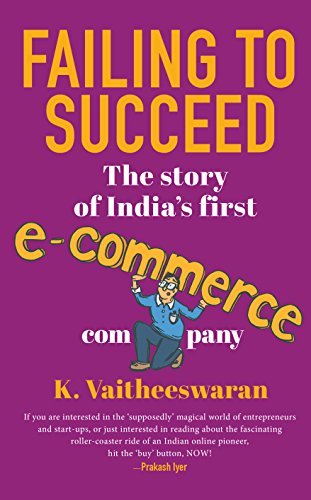Are you ‘brupid’? – An extract from K. Vaitheeswaran’s ‘Failing to Succeed’

If you are an aspiring first-generation entrepreneur, here’s an important tip: you must make sure your family understands the risks you are about to take and they are fully supportive of the decision; without their encouragement, you will not be able to go ahead.
Given my family background, we had no assets, hardly any savings and a six-year-old son. So leaving the safety net of a job was a difficult decision. I had a long chat with my wife Radhika. She had obtained her Masters in Engineering from National Institute of Technology (NIT), Tiruchirappalli, but she had recently stopped working due to personal reasons. We needed my monthly salary to put food on the table. Seeing my passion for an e-commerce start-up, she agreed to my plea conditionally. If I could make a down payment on an apartment, however small, she would manage the household and allow me to chase my dreams. I put all our savings together, got a Citibank loan and made the down payment for a 1,100 square-feet flat. Years later, for long periods when I stopped drawing a salary, the small roof over our heads was a big solace.
In June 1999, I quit my job at Wipro, and there was no more looking back.
I had just crossed the Rubicon in my mind, and I was now an entrepreneur.
Entrepreneurs are perceived as a unique breed of people who are wired differently. What makes a good entrepreneur? Many theories abound and, for sure, they need to be smart and hardworking, inspirational and persuasive, submissive and aggressive, and so on. I agree with all of these but I have a different view on this.
First and foremost, any professional-turned-entrepreneur has to be ‘brupid’.
No ‘normal’ person will leave the comforts and security of a well-paying job to become a first-generation entrepreneur, and a person needs to be stupid to make this move. Starting up is like going into a battle with the odds stacked against the entrepreneur who must be brave to fight and survive. But to win this battle, an entrepreneur must be equal parts brave and stupid, in other words ‘brupid’.
When I look back, I can see three unrelated incidents that triggered my entrepreneurial journey—the online ad from Amazon.com selling books, Wipro’s e-commerce division rejecting my job application and my absence from work for a couple of days which went totally unnoticed.
All start-up entrepreneurs have similar triggers to narrate. I am amused by some of the trigger stories I come across: ‘I did not get a menu; so I started a restaurant-rating company’, ‘I did not get my medicines at the local pharmacy; so I started an online pharmacy’, ‘I did not get clothes of my size; so I started an online fashion site.’ There might well be a day when someone might say: ‘My Diwali rocket failed to take off properly; so I built a private rocket-launching system!’
Let me declare now: I looked around but could not find any online shop in India; so I co-founded India’s first e-commerce company.
For a change, both parts of the statement are correct.
***

In 1999, when hardly anyone in India transacted on the Internet, K. Vaitheeswaran co-founded India’s first e-commerce company. Yet, years later, when e-commerce was exploding in India—despite enjoying first-mover advantage—Indiaplaza shut down. What went wrong? Lack of funding? Wrong strategies? Or was it ‘something else’?
For the first time ever, Vaitheeswaran reveals that it was indeed something else—a set of inexplicable events that destroyed what could have been a profitable business (an extreme rarity among technology start-ups). He bares his extraordinary trials and tribulations while dealing with business failure and the impossible pressures that can threaten entrepreneurs in India. Coming at the back of stories of young start-ups raising billions of dollars in funding and creating unicorns in just a few years, as well as the recent setbacks in the e-commerce industry, Failing to Succeed delves deep into the dark side of starting up and its myriad pitfalls.
***

